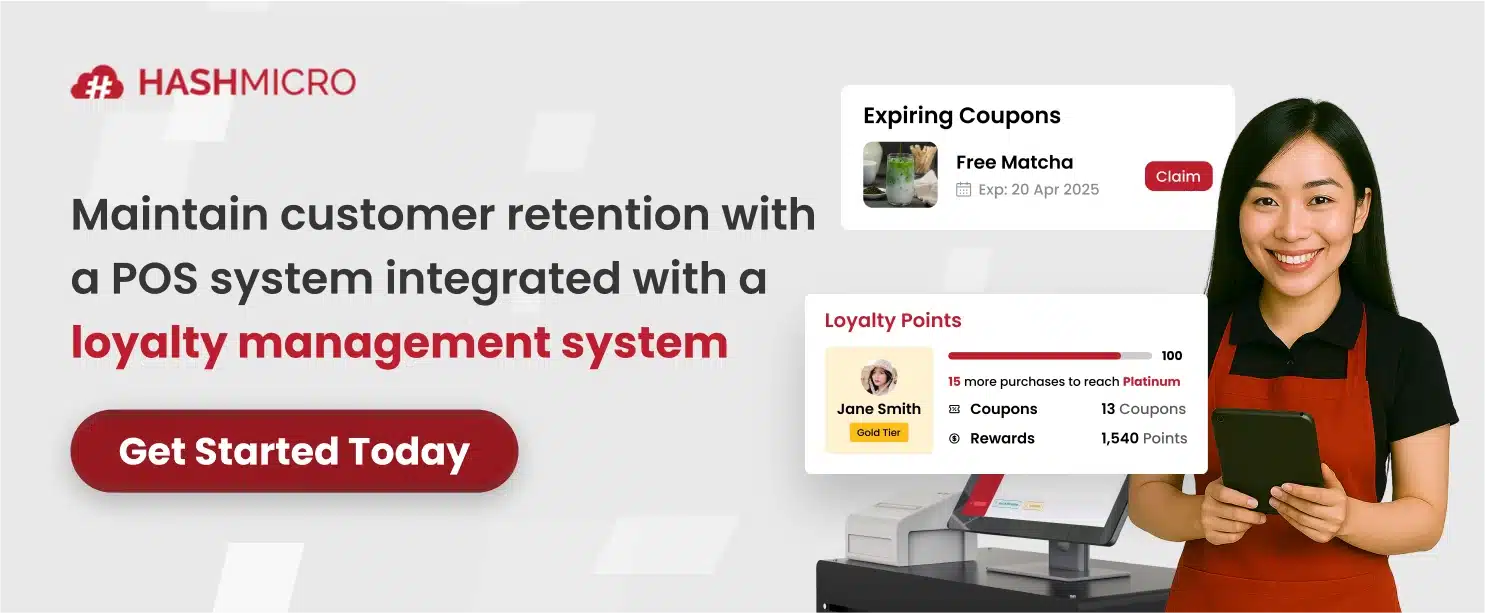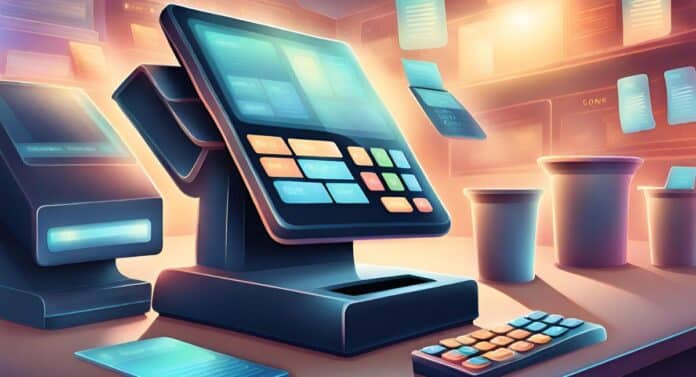In today’s fast-paced retail environment, staying ahead of the competition requires more than just great products and customer service. Imagine a bustling store where every transaction is seamless, inventory is automatically updated, and sales data is instantly accessible—all thanks to a Point of Sale (POS) system.
POS systems have revolutionized the retail industry, offering businesses an efficient way to manage sales and streamline operations. Whether you run a small boutique or a large chain, understanding the power of a modern POS system can significantly impact your bottom line.
Key Takeaways
|

Table of Content:
Table of Content
What is POS System?
A Point of Sale (POS) system is a comprehensive solution that combines hardware and software to manage sales transactions and business operations. At its core, a POS system processes payments from customers, but its functionality extends far beyond that.
Related article: Find out if POS and ERP programs are similar in our article POS ERP Program: Are They Similar?
How a POS System Works
As mentioned before, a POS system operates through a combination of hardware and software to facilitate and manage transactions. Here’s a step-by-step overview of how it works:
- Transaction Initiation: The process begins when a customer decides to make a purchase. The cashier scans the product’s barcode or enters the item details into the POS system.
- Data Processing: The POS software processes the transaction by calculating the total cost, including taxes and discounts. It then updates the inventory in real-time, deducting the sold items from the stock count.
- Payment Processing: The customer selects their preferred payment method—cash, credit/debit card, mobile payment, or digital wallet. The POS system interfaces with payment gateways to securely process card transactions and obtain authorization from the customer’s bank.
- Receipt Generation: Once the payment is approved, the POS system prints or emails a receipt to the customer. This receipt includes details of the purchase, the total amount paid, and any applicable loyalty points.
- Data Storage and Reporting: The POS system records all transaction data, which can be accessed later for generating sales reports, analyzing customer behavior, and making informed business decisions. The stored data helps in managing inventory, tracking sales trends, and understanding peak sales periods.
- Additional Functions: Advanced POS systems integrate with other business tools like CRM systems, accounting software, and e-commerce platforms. This integration enables a seamless flow of information across various aspects of the business, enhancing overall operational efficiency.
By streamlining these processes, a POS system not only simplifies daily operations but also provides valuable insights that help businesses grow and adapt to changing market conditions.
The Benefits of Using POS Software
1. Enhanced Business Insights
A POS system provides a comprehensive understanding of your business operations. It tracks daily and monthly sales, inventory levels, and revenue, allowing you to maintain better control and balance the demands of your company. This leads to more informed decision-making and increased profitability.
2. Improved Analysis and Planning
With a POS system, you can easily track inventory, analyze sales trends, and plan promotions. Sales reports help estimate future trends and identify which products are performing well, enabling you to make data-driven decisions for business growth.
3. Optimized Business Operations
A POS system streamlines the management of corporate data and documents, improving the efficiency of daily sales activities like invoice management, order processing, and sales tracking. Features like barcode scanning and credit card terminals make managing businesses of all sizes more effective.
4. Enhanced Customer Engagement
POS systems facilitate better communication with customers by storing their information, allowing for personalized marketing and offers. This strengthens customer relationships and loyalty, leading to increased repeat business. Mobile POS systems further enhance customer experience by enabling flexible transactions anywhere in the store.
Also read: 7 Benefits of POS System for Retail Business
The Crucial Role of POS Systems in Singapore’s Modern Business Landscape
In today’s rapidly evolving business environment, Retail POS systems have become essential tools for retailers. Modern POS systems now integrate advanced technologies such as mobile functionality and contactless payments. These features not only streamline transactions but also enhance customer safety and convenience, catering to the contemporary demand for quick and secure payment solutions.
The choice between cloud-based and on-premise POS systems is crucial for businesses. Cloud-based systems offer unparalleled flexibility and scalability, providing access to data and functionalities from anywhere with an internet connection. This is ideal for businesses with multiple locations or those needing real-time data analytics and reporting. Conversely, on-premise systems offer robust control and security, though they require a higher initial investment. These systems allow for significant customization, tailored to specific business needs.
POS systems are also pivotal in supporting omnichannel strategies by seamlessly integrating with e-commerce platforms. This integration ensures a unified customer experience across online and offline channels, facilitating consistent inventory management, pricing, and customer data. Such capabilities are essential for meeting the needs of modern consumers who expect a seamless shopping experience, whether online, in-store, or through a combination of both.
As Singapore’s retail landscape continues to evolve, the adaptability and customer-centric approach provided by modern POS systems are vital for businesses aiming to thrive in a competitive market. Leveraging these advanced systems can enhance operational efficiency, boost customer satisfaction, and position businesses for success in the fast-paced retail sector.
Also Read: Top POS System Recommendations – Explore the best software options available this year and find the right fit for your business needs.
Conclusion
Point of Sale (POS) systems are indispensable tools in the modern business landscape, offering a range of benefits from enhanced business insights to improved customer engagement. They streamline operations by automating transactions, managing inventory, and providing real-time data analytics. The choice between cloud-based and on-premise systems depends on business needs, but both offer unique advantages in flexibility, control, and integration capabilities. Modern POS systems support omnichannel strategies, ensuring a seamless customer experience across online and offline platforms.
For businesses in Singapore looking to leverage these benefits, HashMicro’s POS system provides a comprehensive and adaptable solution. HashMicro offers robust features designed to enhance operational efficiency and customer satisfaction, positioning businesses for success in a competitive market. By choosing HashMicro, businesses can harness the full potential of modern POS technology to drive growth and improve overall performance.
So, don’t wait—use the best POS system to elevate your company. Get the free demo and 70% funding for your company from CTC Grant now!

{
“@context”: “https://schema.org”,
“@type”: “FAQPage”,
“mainEntity”: [{
“@type”: “Question”,
“name”: “What is POS System?”,
“acceptedAnswer”: {
“@type”: “Answer”,
“text”: “The POS stands for Point of Sale. According to Investopedia, a sale is a transaction between two or more parties in which the buyer receives tangible or intangible goods, services, or assets in exchange for money. POS, or Point of Sale is a system that allows your company to make sales or conduct commercial transactions with customers.”
}
},{
“@type”: “Question”,
“name”: “What are The Benefits of Using POS?”,
“acceptedAnswer”: {
“@type”: “Answer”,
“text”: “1. Enhance positive impact for your business
2. Helps you in analyzing and planning
3. Optimize your business
4. Helps you to establish deeper communication with clients”
}
}]
}























































